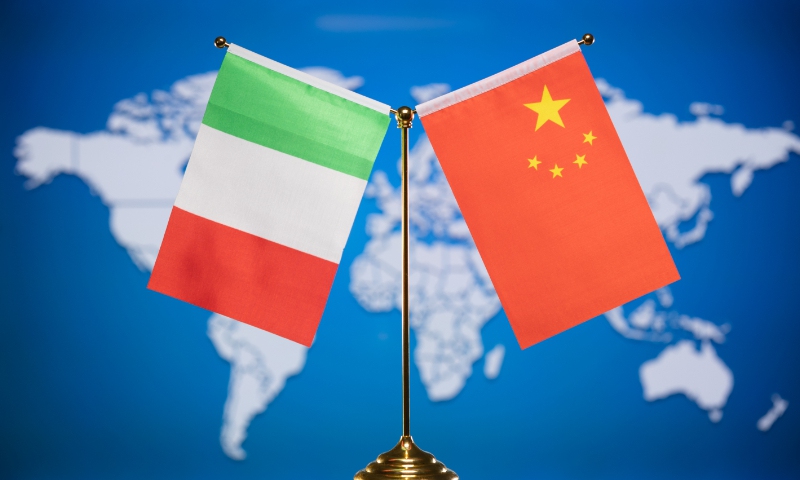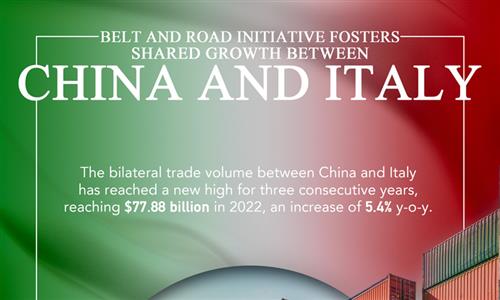Italian FM’s visit underscores willingness to strengthen ties with China, despite Western ‘decoupling’ rhetoric

China-Italy Photo: VCG
Italy attaches great importance to maintaining stable relations with China despite Western rhetoric of "decoupling" or "de-risking", the Global Times learned from the 2023 China International Fair for Trade in Services (CIFTIS) in Beijing, as the Italian foreign minister kicked off an official visit to China.
There will be no "massive rewinding" of trade and investment internationalization, a senior Italian trade representative said at the CIFTIS over the weekend in Beijing. Italy sent one of the largest delegations to the event.
When asked to comment about the rhetoric of "decoupling", Gianpaolo Bruno, trade commissioner with the Italian Trade Agency, told the Global Times in an exclusive interview on Saturday that he does not think it will "cause a massive change" that people read about in the newspapers.
"Companies sometimes choose not to respond to geopolitical issues. They would like to engage in maintaining trade relations. They will not stop."
The remarks came amid the three-day visit of the Italian Vice-President of the Council of Ministers, as well as Foreign Minister Antonio Tajani, to China, scheduled from Sunday to Tuesday. His visit comes amid Western media reports that Italy is considering not to renew the Belt and Road cooperation agreement, and the visiting Italian foreign minister may discuss the issue with China.
During the visit, Tajani and Wang Yi, a member of the Political Bureau of the CPC Central Committee and Chinese Foreign Minister, will attend the 11th Joint Meeting of the China-Italy Government Committee.
"We count on China as a major market and a major economic counterpart. So we hope with this mission we can lay the ground for the further development of our brilliant relationship," Bruno said, noting that next year marks the 20th anniversary of the establishment of the China-Italy comprehensive strategic partnership.
A representative of an Italian private art school who is attending the CIFTIS told the Global Times on Sunday that after the pandemic, the number of Chinese students to Italy increased significantly, which reflects the potential of cultural cooperation between the two countries.
In the past five years, bilateral trade has increased by 42 percent, reaching nearly $80 billion last year. Italy has served as the guest country of honor at the China International Import Expo and Hainan Expo.
Experts said that economic and trade relations between China and Italy have been relatively stable among the G7 nations despite global economic woes, with both sides having come to realize that economic "decoupling" with China is not feasible.
"The Italian foreign minister's decision to visit China underscores its commitment to strengthening economic and trade ties with China," Zhang Jianping, director of the Center for Regional Economy with the Chinese Academy of International Trade and Economic Cooperation, told the Global Times on Sunday.
"We are now in an era of globalization that has developed over several decades, where the economies of countries are intricately linked through global supply chains...from this perspective, his visit to China is beneficial for both nations," Zhang said.
As a member of the developed world, Italy complements China well in economic structure, and there are ample rooms for cooperation in industry and supply chains.
Italy's influence in auto-making, especially in the mid- to high-end segments, holds weight in China. Italy also has substantial market growth potential in China for its machinery and equipment, including services, luxury goods and agricultural products.
While cooperation under the comprehensive strategic partnership will be discussed, the most notable one for the Italian official's visit lies on the country's follow-up move on the Belt and Road Initiative (BRI), which the country is mulling to quit.
"The BRI is definitely an unavoidable thing to discuss during Italian foreign minister's visit...I think the Chinese side will discuss Belt and Road cooperation with the Italian side, but how much can the Italian side listen to and whether it can finally change its tendency toward the joint initiative needs to be determined from whether there will be any follow-up communication between the two sides," Cui Hongjian, director of the Department of European Studies at the China Institute of International Studies, told the Global Times on Sunday.
"Also, Italy has definitely been influenced by the US...but external factors work through internal factors," Cui said, indicating that there are also problems within Italy, including the fact that after the new government came to power, its China policy became increasingly conservative, which is in stark contrast from the Conte government.
Experts said that if Italy decides not to renew the BRI agreement, Italy may risk losing opportunities to participate in some projects under the Belt and Road framework. "For example, future cooperation between the two parties in further optimizing the policy environment may come to an end," Cui noted.
Declining to comment on the BRI cooperation renewal, Bruno said he is sure that the [Italian] government will take care in the best possible way not to ruin the relationship with China. "There will be a balanced approach. And we hope that our governments will make the right decisions for the benefit of our peoples."


